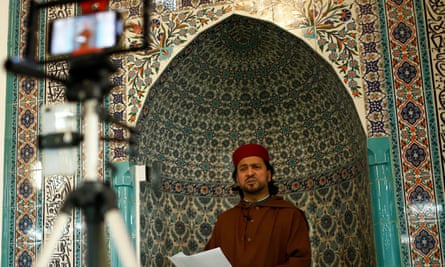“Every law-abiding citizen in this country should have the right to a bank account,” Nigel Farage writes in the Daily Telegraph as he claims to stand up for vulnerable people in his campaign against “woke capitalism”.
But does he really mean it?
Many leading British Muslim civil society activists and charities have had their bank accounts closed for years with little or no explanation. Take Finsbury Park mosque in north London, for example. HSBC closed its account, and other banks refused to take the mosque’s custom, despite no law having been broken. The mosque brought a successful libel action against Thomson Reuters, whose listing for the mosque on a risk database had led to HSBC’s decision.
Or consider one of the largest and most longstanding Muslim charities, Islamic Relief, which HSBC debanked. This had serious consequences, including hindering the delivery of crucial aid to earthquake victims in Nepal in 2015. Other banks, fortunately, did not follow suit.
What about pro-Palestinian groups? In 2016, the Co-op Bank closed down the bank account of the pro-Palestinian NGO Friends of Al-Aqsa, the Palestinian Solidarity Campaign, and as many as 25 Palestinian-affiliated organisations, reportedly without explanation.
Last year, Fadi Itani OBE, chief executive of the Muslim Charities Forum, warned of “hidden discrimination against certain charities because of the names, the areas they work in”. These are mainstream Muslim organisations with no criminal associations.
The same scenario is also faced by dozens of “law-abiding citizens” who have had their bank accounts closed. Lacking Farage’s wealth, as they do, their livelihoods have been affected and reputations damaged. Some have come forward, for example the activist Anas al-Tikriti and imam Ajmal Masroor, but I have spoken to many other Muslims who would rather keep their heads down, worried about further repercussions.

One of the threads connecting many of these organisations and individuals is that they have been subject to smears in the media. Some have had to challenge spurious associations with terrorism or “Islamism”. Yet, unlike Farage, these individuals and groups have not had the luxury of prime ministerial support when their bank accounts have been closed.
Will Nigel Farage stand up for these law-abiding British Muslims and Muslim organisations, including those he regularly maligns and castigates as a fifth column?
What about the Daily Telegraph, who complained of “self-appointed arbiters” closing down personal bank accounts in its editorial on Wednesday? The same paper was strangely silent when HSBC arbitrarily closed the accounts of Muslim individuals and institutions from 2014 onwards. The paper’s chief political columnist, Peter Oborne, resigned after it refused to publish his report on the issue. He was one of the few at the time willing to actively campaign on it, including by raising it with the then chancellor, George Osborne, and then Treasury minister Harriett Baldwin.
What about political commentators such as Andrew Neil? He has explained how he does not have to be a “friend” of Farage, or share many of his political views, to condemn a bank removing Farage’s services. Will he – and others like him – also stand up for the rights of ordinary British Muslims who have faced similar challenges?
The undeniable reality is that there is astonishing hypocrisy at play.
So many arms of the establishment – from the prime minister through to the media backing him – have quickly mobilised against the NatWest and Coutts banking chiefs over the Nigel Farage banking saga. Where were they when the bank accounts of British Muslims and Muslim organisations were being closed?
A complete review of banking practices is desperately needed: one that examines how internal decisions on bank account closures take place, how they use third parties who inform banks on issues of suitability, and how these third parties collect their information. World-Check, for example, is an influential database used by banks globally to help identify and manage financial, regulatory and reputational risk to large companies. Many Muslim individuals and institutions have been placed on this database as potential risks without evidence of wrongdoing.
The ultimate question is: are those speaking out on account closures doing so to help themselves and their privileged friends, or are they really trying to ensure universal banking rights, including for those whose political views they vehemently disagree with? The answer should be simple, but I fear the reality might be quite different.
Miqdaad Versi is a spokesman for the Muslim Council of Britain. He is writing in a personal capacity
Do you have an opinion on the issues raised in this article? If you would like to submit a response of up to 300 words by email to be considered for publication in our letters section, please click here.

